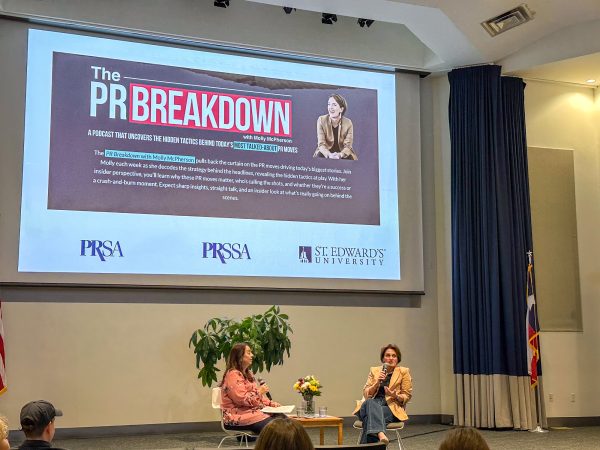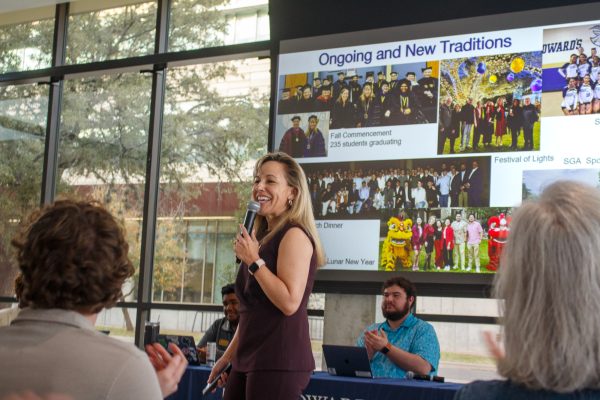5PROFILE-put on print page
Standing well over six feet tall and with loads of academic accolades to his name, it is hard not to be a little intimidated at first by Drew Loewe, an associate professor of English Writing and Rhetoric at St. Edward’s University.
Since he started teaching in 2008, Loewe has accomplished many things during the seven years he has been at St. Edward’s. He has been published 12 times in various academic formats; he has been a part of 14 different administrative and university positions, ranging from fencing advisor to director of the university’s Writing Center; and he has even attended seven different workshops and symposiums since 2012 to help educate others in his field about teaching and designing effective writing assignments.
With all that in mind, it is not surprising that senior Shelby Sementelli, an English writing and rhetoric major, was intimidated when she first met Loewe in a text and discourse class during her sophomore year.
“This sounds goofy, but I was intimidated by his stature. I was also intimidated by his expansive knowledge (of rhetoric), and at first I thought he was going to laugh at my surface level understanding of the readings for class,” Sementelli said. “I now know that was silly.”
Many students who encounter Loewe usually feel a bit daunted at first. But first impressions, like looks, can be deceiving. To really understand Loewe, his style of teaching and just what makes him appear intimidating, it helps to know a little about his past.
“I’m originally from Southern California. I grew up in a town about an hour between Los Angeles and Santa Barbara,” Loewe said. “As a kid I liked to do pretty much the same things I like to do now: I like to read, I like to watch football and I like to ride my bike. I got the golf bug at age 11 and played pretty much every day till I was 18. I was on the golf team in high school and I worked at the golf course so I was surrounded by golf.”
After graduating high school, Loewe went to the only college he applied to —the University of California, Santa Barbara and graduated in 1989 with a bachelor’s degree in philosophy. Immediately afterwards, he applied and was admitted into the Gonzaga University School of Law (GU) in Spokane, Washington; and in 1993, after graduating cum laude from GU, he decided to move back to California, where he prepared to take the bar exam.
“I took and, thank God, passed the bar and began working as an attorney in Southern California,” Loewe said. “At that point I thought I’d live my whole life in California. Then I met my wife on America Online (AOL).”
Nowadays, it is very commonplace for people to meet on Match.com or over some other online matchmaking service. But in the days of dial-up, things were a bit different.
“We ‘met’ on AOL in a random internet chatroom in December 1995 and met in person in 1996. We were engaged by summer 1996 and got married in October 1997. We didn’t live in the same state for the vast majority of that time,” Loewe said. “(After we were married) she moved to California and we formed a plan that we would come to Texas as soon as I had enough years of law practice to be admitted to Texas without having to take the bar. So that’s what we did — we lived in San Antonio where I practiced law and she worked as a consultant for the North American Development Bank.”
However, life as a litigation lawyer started to become unappealing for Loewe, so in 2002, he decided to quit practicing law.
“The firm where I was working did insurance defense so that meant we were always reporting and dealing with insurance companies and that’s a real grind. They have a lot of stupid rigamarole about how you budget and how you report things. I hate all that stuff,” Loewe said. “The practice of law itself is interesting, or can be, but doing it on a sort of billable-hour-hamster-wheel just got to be kind of soul-sucking.”
Finding himself in a difficult place, Loewe tried to think about things he enjoys as he planned his next steps. After a couple of classes at the University of Texas at San Antonio(UTSA), he decided that he wanted to teach at the university level.
“I always found teaching attractive and interesting,” Loewe said. “I’m influenced by the fact that my father taught high school English for 35 years; that my sisters has taught English for 25 years at community college; and that my brother-in-law is an English teacher.”
In 2004, he graduated from UTSA with a master’s in English. Five years later, he received his doctorate in English from Texas Christian University(TCU), where he wrote his dissertation over one of his favorite rhetorical figures —Kenneth Burke.
“I love Burke because he’s right at the crossroads of literature and culture and rhetoric and was involved, personally and professionally, with so many important figures of the 20th century,” Loewe said. “He’s a good example of an approach, because it’s not a machine that you plug things into and you get certain kind of answers. It’s more of an orientation to a way of being that constantly (pushes one to) examine (everything) including (one’s) own assumptions.”
At first, Loewe taught by the traditional, lecture based approach; but as his experience with teaching grew, he started to tweak the way he taught. Now he incorporates websites like Reddit into his current theories of rhetoric and composition class. In front of students, though, Loewe says he prefers to teach via the Socratic method.
“Rather than (telling students), ‘Here’s my thoughts on something. Absorb them and spit them back to me in the approved fashion,’ the Socratic method can (allow us) to move the ball forward in productive ways and it (allows one) to be honest to the fact that you, as a teacher, are also a lifelong learner,” Loewe said.
Loewe likes to holds his students to a high standard.
“If you have lower standards, students will race to the bottom to join you there. If you have high standards, a lot of times students will work their ass off for a ‘B’ but they would otherwise be a ‘C’ or whatever student,” Loewe said.
Loewe’s dedication to students inside the classroom is matched only by his dedication and concern for them outside the classroom.
“I’m from Kansas and one time over the summer there was a tornado kind of close to my parents’ house,” Sementelli said. “The next day I had an email in my inbox from Dr. Loewe. He wanted to make sure my family and I were okay. It really warmed my heart to know that I had a professor who cared so much about me.”
Outside of academic, Loewe is semi-serious baker of bread.
“I’ve gotten to where I can consistently produce — without bragging — an excellent, boule of bread. And my challenge for this year that I’ve set for myself is the baguette,” Loewe said.
Looking back, Loewe notes that he would not be where he is today without the help and guidance of those like Ann George, his TCU dissertation chair and the assistance of many others, like professor of English writing and rhetoric Mary Rist.
“I always say everybody at the department would take a bullet for her. She’s just great about helping us in little things like scheduling and ways that we can all manage with our kids or whatever,” Loewe said. “And just, y’know, giving advice about which committees to join and not join and sort of keeping everything running. I mean our department meetings always have wine and snacks and lots of laughter… and that’s not always true of academic department meetings… and (it is) due mostly to her efforts.”






